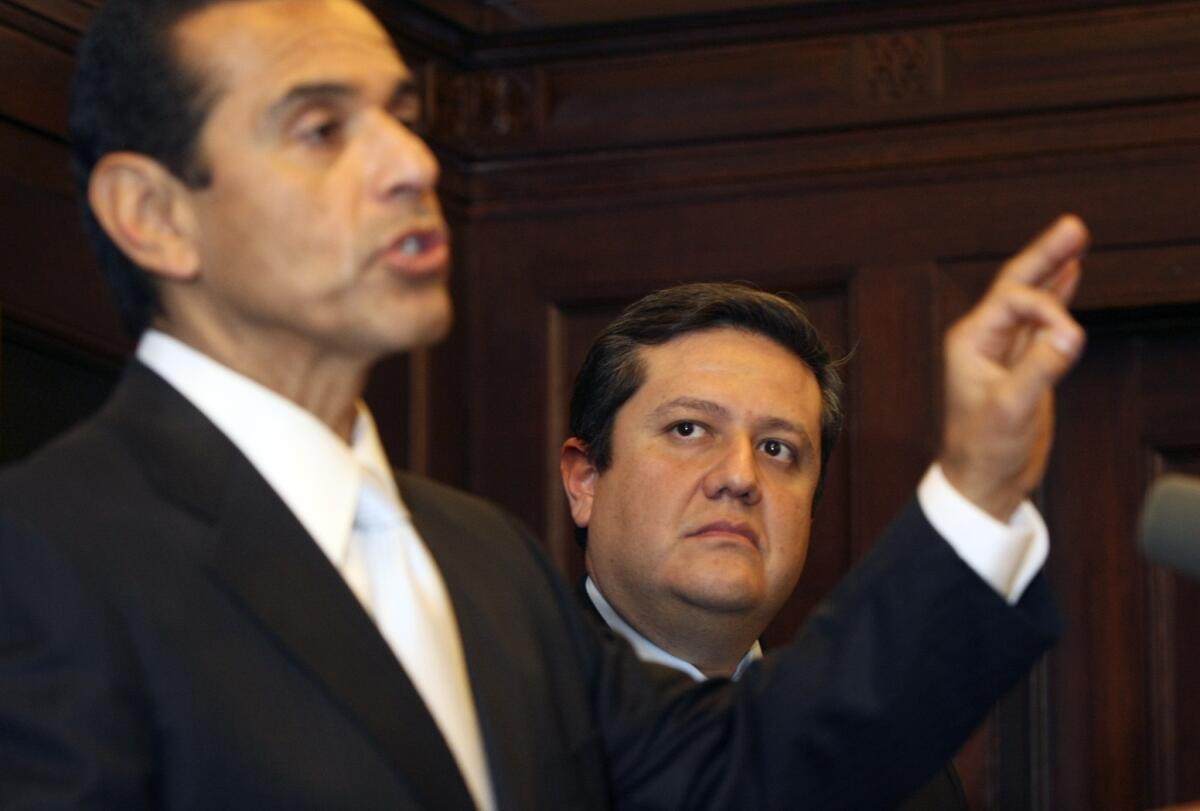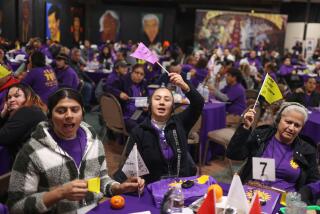Time for public employee unions to pick up the tab

For more than half of my 38 years in the news business, I’ve been a member of a union, though I’m not currently. And my late father was a proud Teamster for decades.
So I appreciate the goods that unions deliver to nearly 15 million members in the United States: living wages and good benefits. Workplace safety. A measure of job security. And protection against management abuse.
In other words, don’t count me among those who vilify organized labor, which in many parts of the country offers the best hope for hanging on to a place in the middle class. And when it comes to public employee unions, no, they shouldn’t have to trade pensions for 401(k)s, though a hybrid wouldn’t be so bad. We’re going to have enough of a disaster on our hands when non-union retirees end up flat broke and on the dole, especially if Social Security gets trimmed.
If you were waiting for a “but,” here it comes.
It’s time for public employee unions to wake up and take a look around. Government services are shrinking, cities are crumbling, and they’re enjoying pay and benefit packages that many in the private sector would kill for. They need to give a little back. Yeah, I know, some of them already have. But it’s time for a little more.
On healthcare contributions. On raises. On pensions. On retirement ages.
Why?
Because up and down the state of California, and beyond, public officials foolishly negotiated contracts they can’t pay for without taking a cleaver to basic services, including police and fire protection, park maintenance, street repair. It’s not just the fault of those contracts. There’s also the economic dip and the housing crash, which put a squeeze on revenue. But that perfect storm has led to big trouble in San Jose and Stockton and Fresno and San Diego.
And of course in Los Angeles.
On Monday, Mayor Villaraigosa gave us a budget that looks OK this year — though you can never trust his numbers. Just a few months ago he was telling us he had to have a half-cent sales tax hike or it’d be Mad Max around here. The tax was rejected, and now the mayor who threatened chaos is announcing restored services.
He added, however, that if the next mayor doesn’t negotiate some givebacks, we’re in trouble.
He’s slick, isn’t he? Villaraigosa will be sipping a cocktail on a beach somewhere in a couple of years, or running for who knows what, telling everyone that services were being restored when he left office thanks to all the tough choices he made. And yes, he did take on his union brethren. But he’s only begun to clean up the mess he made after giving away the store in 2007 (along with mayoral candidates Wendy Greuel and Eric Garcetti), promising 25% raises over several years.
“If labor concessions and police overtime controls are not achieved,” says a report from Miguel Santana, the city’s chief administrative officer, “the deficit for 2014-15 balloons to $267 million and the outlook will no longer show a surplus in 2017-18 but a deficit of $93 million.”
Santana told me that in order for the city to avoid deficits, 60% of the civilian workforce is going to have to forgo 5.5% raises set for Jan. 1. That’s a lousy Christmas present, for sure, but Santa has been good in recent years.
“Even those who received no raises for four years” will have had 17.25% in total raises since 2006, Santana said.
Under Villaraigosa’s plan, those who already got a 5.5% raise this year would have to give it back, and there would be no raises until July 2017.
The unions are sure to fight to the death on any such sacrifice. And they’ll say no, as well, to another budget-balancing concession Santana is pushing.
If every city employee were to contribute 10% of the cost of his or her health insurance, there’d be a savings of about $51 million a year. Currently, about 70% of the city’s workforce pays nothing for healthcare premiums.
Did you just spit on yourself?
You read correctly. They pay nothing, and who wouldn’t love that deal?
You won’t hear L.A.’s labor bosses talking about givebacks, other than to remind everyone that they’ve already agreed to some, particularly on deals for future employees. Brian D’Arcy, head of the IBEW local that has 8,600 DWP employees and has plowed a few million dollars into campaign spending on Greuel’s behalf, told me he’s expecting cost-of-living increases.
And he’s not kidding, even though his employees make as much as 40% more than counterparts in other city departments and 20% more than employees at 13 comparable utilities, according to a report by the ratepayer advocate.
“I have labor blood in me,” said Jaime Regalado, former head of the Pat Brown Institute of Public Affairs at Cal State L.A., who says he abhors attacks on unions. But he added that he believes public employees “are going to have to give back until we have a different kind of economy, and I’m not holding my breath on that.”
Regalado said he believes that for labor, it will come down to a question of givebacks or furloughs, and possibly even layoffs.
Garcetti has already negotiated some concessions, and Greuel says she’ll ask for more, despite being bankrolled by the very people she’ll need to crack down on. But they’re both pro-labor in a big way, so who knows if they’ll be pit bulls or lap dogs.
Labor leaders, meanwhile, should ask themselves this:
If a few reasonable tweaks can save jobs, maintain services and silence a few critics, would that be such a bad deal?
More to Read
Start your day right
Sign up for Essential California for news, features and recommendations from the L.A. Times and beyond in your inbox six days a week.
You may occasionally receive promotional content from the Los Angeles Times.







